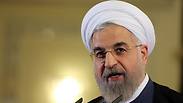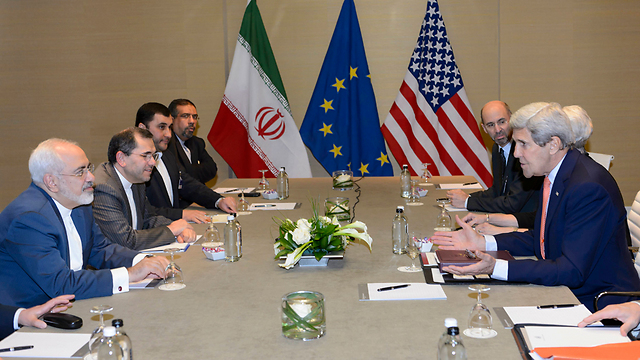
Iran lawmakers curtailed on power to veto nuclear deal
To pave way for final-status deal with world powers, Iranian parliament votes to give right of approval of deal to country's Supreme National Security Council, controlled by Khamenei
Iran's parliament curtailed its own power to block a nuclear deal with world powers Sunday, effectively removing a longstanding threat that a final accord could be torn up by lawmakers.
A draft bill presented on Wednesday laid down strict criteria for Iran to accept any agreement, including banning access to military sites and scientists, which threatens to complicate talks on a final accord, due to be finalized by June 30.
Iranian lawmakers voted to ban access to military sites and scientists as part of any future deal.
However, in a boost to President Hassan Rouhani's government, key amendments to the proposed legislation will now move the formal supervision of a deal out of the hands of lawmakers.
The original text had set three key criteria that parliament would require to say had been met for an agreement to be binding.
But the amended bill instead gives that right of supervision to the country's Supreme National Security Council (SNSC).
The council comprises government ministers, military commanders and other top officials appointed by supreme leader Ayatollah Ali Khamenei.
It is chaired by Rouhani, who is pushing hard for a nuclear deal, but is ultimately controlled by Khamenei, who will have the final word on any nuclear accord.
The bill also bans access to Iran's military sites, stating in part, "The International Atomic Energy Agency, within the framework of the safeguard agreement, is allowed to carry out conventional inspections of nuclear sites."
However it concludes that "access to military, security and sensitive non-nuclear sites, as well as documents and scientists, is forbidden."
Iran's nuclear negotiators say they have already agreed to grant United Nations inspectors "managed access" to military sites under strict control and specific circumstances. That right includes allowing inspectors to take environmental samples in the vicinity of military sites.
But Iranian officials, including supreme authority Ayatollah Ali Khameni, have strongly rejected the idea of Iranian scientists being interviewed, calling that a violation of the country's dignity and sovereignty.
The bill must be ratified by the Guardian Council, a constitutional watchdog, to become a law.
"Whatever decision the leader takes in this regard, we should obey in parliament," speaker Ali Larijani said after 199 MPs voted for the amendments in the 290-member chamber. "We should not tie the hands of the leader."
Only three lawmakers opposed the changes and five abstained, with six not voting and dozens more absent.
Although the sponsor of the original bill, Alaedin Boroujerdi, an MP and chairman of parliament's national security and foreign policy committee, said it was designed to insulate Iran's negotiators from the West's "excessive demands", Larijani suggested otherwise.
"We want to help the country and not create new problems," he said, referring to the need to coordinate with the SNSC, which had not had prior sight of the draft legislation but whose opinion was necessary.
According to the official IRNA news agency Larijani earlier told Ahmad Tavakoli, a conservative MP critical of the bill being delayed: "We are not discussing the sale of potatoes, but an important issue for the country."
Despite Sunday's changes, any nuclear deal will still have to be ratified by parliament but it would be highly unlikely by that stage that lawmakers would oppose any text approved by the SNSC.
The bill still requires the complete lifting of sanctions imposed on Iran as punishment for its nuclear program under which leading states have suspected the Islamic republic of developing a bomb.
Iran denies any such aim and says its atomic activities are for purely peaceful clean energy development purposes that would reduce its reliance on dirty fossil fuels.
The Associated Press contributed to this report.











